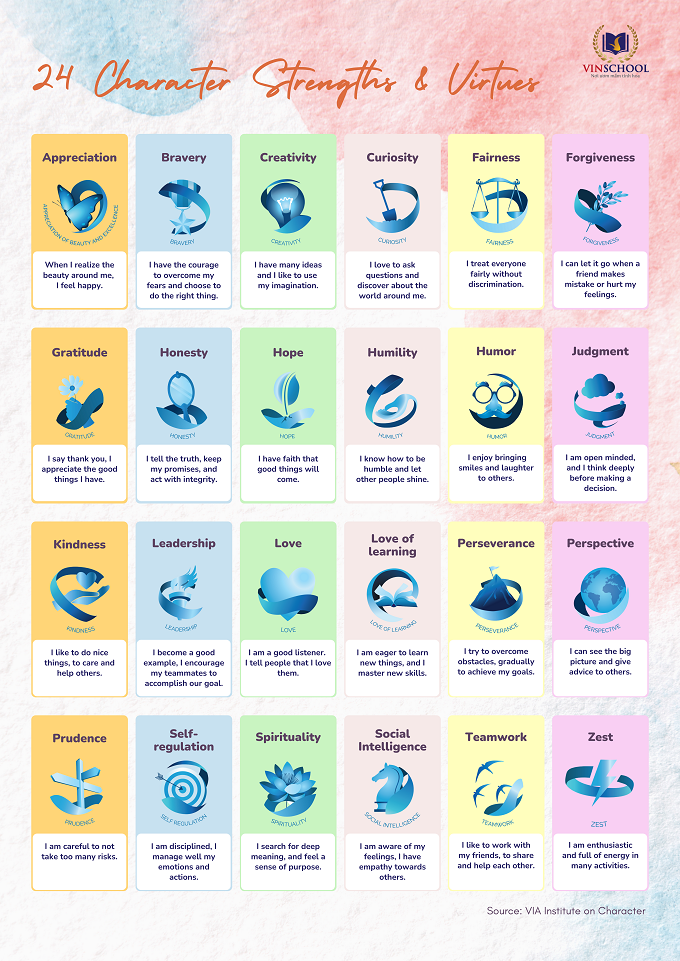Identify 24 character strengths and effective ways to develop your child’s strengths
In the early 21st century, research conducted by scientists at VIA Institute and a book entitled “Character Strengths and Virtues” were said to create a breakthrough in the social sciences. Dr. Martin Seligman, a professor of psychology, and his associates studied all the major traditions and philosophies of the world and found the 24 most universal character strengths of both children and adults, which have been common in virtually all the cultures over the past 3,000 years.
Studies show that each of us has all 24 potential character strengths with different degrees, yet as many as 70% of the people participating in the studies were not well aware of their character strengths. This article will provide you with a systematic table of the 24 character strengths. Now spend time talking with your child to identify the 5 most outstanding character strengths of each member in your family, and learn about ways to help him or her develop all the 24 character strengths through this article.
1. Why is it extremely important to identify and develop character strengths?
– Identifying their own strengths helps children build their self-esteem, self-confidence and self-satisfaction, thereby allowing them to always feel motivated to experience and learn throughout their lives.
– Reminding children of their strengths is especially important in improving their mental health. The strengths help the children go through the tough times in life until they fully grow up.
– It is not difficult to realize that in an increasingly developed world, people tend to recognize the weaknesses (which leads to criticism and judgment) more easily than to understand the strengths of themselves and the ones around them. However, if they can see the strengths of themselves and others, they will feel empowered to lead a good life in different fields.
– Research also shows that if a person can recognize his/her own character strengths and qualities, he/she can recognize the strengths and qualities in others. In particular, when they realize the character strengths of their friends and the people around them, they will learn to appreciate and learn from one another, which is a motivation for them to develop other character strengths.
2. Outstanding character strengths of preschool children
Although most preschoolers are not cognitively mature enough to recognize all the 24 character strengths, there are many basic character strengths developed at the preschool age, especially these 10: Love, Social Intelligence, Zest, Love of Learning, Curiosity, Creativity, Perseverance, Bravery, Kindness, and Humor.
These qualities of preschoolers are developed largely through the children’s relationships with their parents and caregivers. Safe and loving attachments will help them make good psychological and social adjustments throughout their lives.
3. How to promote holistic development of these qualities in your child?
The most important thing is not just to see what character strengths your child has, but to help him or her develop all the 24 character strengths. It is scientifically proven that everyone has the potential to possess all of the 24 character strengths, the development of which depends much on the frequency of practice and the constant encouragement children receive from the ones around them.
The four steps below are what parents can do to help children develop their character strengths, as recommended by the VIA Institute on Character:
(1) Make the good
The best way to help your child access positive qualities is to help their brains record beautiful memories. You can do this simply by spending time with your child instead of organizing anything costly. You can give him or her your full attention in a quality amount of time every day (listening to him/her, reading, playing sports, playing games, or his/her favorite games, etc.). In addition, you and the caregivers first need to recognize your own strengths in order to become a role model for your child.
(2) See the good and say the good
Young children do not have enough awareness and vocabulary to understand the meaning of kindness, courage and honesty. You need to help your child identify them. For example, you may tell your child, “I saw you share your toy with your friend. That’s so kind of you!” or “You told everyone the truth and apologized to them. How honest and brave you were!”
Every child has his/her own unique way to express his/her character strengths, which may be really subtle, such as patting an unhappy friend’s back. Therefore, your observation and identification are of great significance for encouraging your child to develop their strengths.
(3) Link the good
Linking external behaviors with positive inner feelings is a good way to help your child engrave these character strengths deeply into their memories, thereby encouraging them to develop the strengths. You may say, for example, “I saw you playing this jigsaw puzzle the whole afternoon. It was hard at times, but you finally did it! You must be feeling proud of yourself, right? You’re so perseverant!”
(4) Remember the good
Reminding your child of their own character strengths will help develop their trust in themselves. For example, before bedtime, you can recall the strengths that your child had that day. “I heard that Linh was unhappy in class this morning. What did you tell her? How did you feel when you comforted her? I think you’re so understanding and empathetic!”
By gradually teaching your child to develop their existing character strengths and helping them hone the other strengths, you can help your child “become a better version of themselves every day”. According to scientists, teaching about strengths is just as important as teaching about other basic subjects. When children aim to develop their character strengths in everything they do (not just for achievements or scores, etc.), they will stay mentally healthy and lead a happy life in the long run.
Reference: VIA Institute on Character







